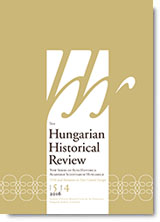Discursive (De)Constructions of the Depoliticized Private Sphere in The Resolution and Balaton Retro
Discursive (De)Constructions of the Depoliticized Private Sphere in The Resolution and Balaton Retro
Author(s): Zsolt GyőriSubject(s): Post-War period (1950 - 1989)
Published by: Magyar Tudományos Akadémia Bölcsészettudományi Kutatóközpont Történettudományi Intézet
Keywords: Kádár era; Goulash Communism; cinema; representations of communism; retro; post-communist nostalgia; documentaries
Summary/Abstract: In this article I examine Gyula Gazdag and Judit Ember’s documentary The Resolution [A határozat, 1972] and Gábor Zsigmond Papp’s Balaton Retro [Balaton retró, 2007] as examples of the discursive production of paradoxes permeating the consolidated Kádár regime. I present the first film, portraying the character assassination of József Ferenczi (the executive manager of the Felcsút cooperative farm in the early 1970s) as a case study of state socialist technologies of power and strategies of constructing the narrative of the immoral and profiteering leader type, the corrupted servant of the community. This fabricated narrative is actually contested by members of the cooperative farm for whom Ferenczi is a symbol of the reform spirit and the promise of prosperity. I argue that the critical power of the film resides both in its meticulous dissection of the discursive and administrative methods used to create enemy images and its reluctance to present a local example of vilification as a general feature of the state socialist episteme. The Resolution presents the consolidated Kádár regime as an establishment torn between rigid ideological foundations and society’s desire for a depoliticised market economy, suffering from the political pressure to remain true to the spirit of communism and the social pressure to allow a greater degree of economic liberalism. In Balaton Retro the popular tourist destination, Lake Balaton, is constructed as a spatial metaphor of both the crisis of the authoritarian system and of Goulash Communism (the name given to the system in Hungary, which constituted a quiet deviation from orthodox doctrines of Marxism-Leninism). The popular notion of the lake as the Hungarian Riviera came into being at the intersection of eastern and western understandings of welfare: on the one hand, the welfare state providing workers cheap holiday opportunities through a network of state-run holiday apartments and camps for children, and on the other, individual welfare, the possessors of which (usually citizens of Western Europe) sought leisure in modern luxury hotels. The emergence of private houses available for well-salaried Hungarian customers was another sign of the many dualities and hybrid meanings uncovered by Papp’s film as symptoms of the general state of the nation during the Kádár era. My analysis of the agency of the voiceover narration will reveal that Balaton Retro is not a manifestation of Ostalgie, but a critical meta-commentary on nostalgic memory. To conclude, I will describe retro as the commodification of a material past and nostalgia as a somewhat sinister legacy of state socialist identity politics.
Journal: The Hungarian historical review : new series of Acta Historica Academiae Scientiarum Hungaricae
- Issue Year: 6/2017
- Issue No: 2
- Page Range: 271-299
- Page Count: 29
- Language: English

